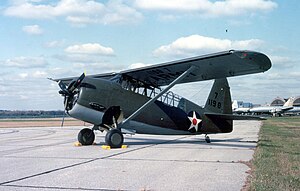| O-52 | |
|---|---|
 The O-52 at National Museum of the United States Air Force The O-52 at National Museum of the United States Air Force | |
| General information | |
| Type | Reconnaissance |
| Manufacturer | Curtiss-Wright |
| Primary users | United States Army Air Corps Soviet Air Forces |
| Number built | 203 |
| History | |
| Introduction date | 1941 |
| First flight | 1940 |


The Curtiss O-52 Owl is an observation aircraft used by the United States Army Air Corps before and during World War II. They were used for anti-submarine searches in Americas and by lend-lease also used on the Eastern Front in Europe by the Soviets.
Design and development
Developed in 1939, the Curtiss O-52 was the last "heavy" observation aircraft developed for the US Army Air Corps. The concept of the two-seat observation aircraft, classed as the "O" series aircraft, dated to World War I, and in 1940, the Army Air Corps ordered 203 Curtiss O-52s for observation duties.
Curtis designated it the Curtiss Model 85, and it was powered by a Pratt & Whitney Wasp radial engine.
Operational history
Upon delivery, the aircraft was used in military maneuvers with the USAAC, but following America's entry into World War II, the USAAF determined that the aircraft did not possess sufficient performance for "modern" combat operations in overseas areas. As a result, the O-52 was relegated to courier duties within the U.S. and short-range submarine patrol over the Gulf of Mexico and Atlantic and Pacific Oceans
O-52 were used by the 2nd Reconnaissance Squadron, which flew them out of Puerto Rico and Trinidad, to search for Nazi U Boats.
The O-52 was the last "O" type aircraft procured in quantity for the Air Corps. Following the attack on Pearl Harbor, the "O" designation was discontinued and the "L" series for liaison-type aircraft was adopted instead.
In November 1942, the USSR ordered 30 O-52 Owls through the Lend-Lease program. Twenty-six were shipped, with only 19 delivered as a number were lost on the North Arctic Route. Of these only ten were accepted into service. They were used operationally for artillery fire spotting and general photographic and observation platforms in north and central areas on the Russian Front during spring–summer 1943. One O-52 was shot down by Luftwaffe fighters. In the report on military tests, the Soviet pilots recognized that the American machine was superior to the outdated Polikarpov R-5, and Polikarpov R-Z spotters used at the front. The aircraft was generally disliked in Soviet use although some were still flying into the 1950s.
Operators
Surviving aircraft
- 40-2746 – O-52 on static display at the Pima Air & Space Museum in Tucson, Arizona.
- 40-2763 – O-52 on static display at the National Museum of the United States Air Force in Dayton, Ohio.
- 40-2769 – O-52 on display at the Yanks Air Museum in Chino, California.
- 40-2804 – O-52 under restoration in Huntington, Indiana. It was previously part of the Walter Soplata collection.
Specifications (O-52)

Data from Curtiss Aircraft 1907–1947, American Warplanes of World War II
General characteristics
- Crew: 2
- Length: 26 ft 4.25 in (8.0328 m)
- Wingspan: 40 ft 9 in (12.42 m)
- Height: 9 ft 11.5 in (3.035 m)
- Wing area: 210 sq ft (20 m)
- Empty weight: 4,231 lb (1,919 kg)
- Gross weight: 5,364 lb (2,433 kg)
- Powerplant: 1 × Pratt & Whitney R-1340-51 Wasp 9-cylinder air-cooled radial piston engine, 600 hp (450 kW)
- Propellers: 3-bladed metal propeller
Performance
- Maximum speed: 220 mph (350 km/h, 190 kn)
- Cruise speed: 192 mph (309 km/h, 167 kn) at 75% power
- Time to altitude: 10,000 ft (3,000 m)
Armament
- Guns: 1 × fixed forward-firing 0.30 in (7.62 mm) machine gun and 1 × 0.30 in (7.62 mm) machine-gun on a flexible mount in the rear cockpit
See also
Aircraft of comparable role, configuration, and era
References
- Notes
- "Curtiss O-52 Owl". www.historyofwar.org. Retrieved 2023-12-03.
- Acree, Chuck (2020-12-04). "The Latin American Anti-Submarine campaign during WWII". LAAHS. Retrieved 2023-12-03.
- Hardesty 1991, p. 253, Appendixes.
- "OWL". Pima Air & Space Museum. Archived from the original on 13 August 2017. Retrieved 30 July 2018.
- "Curtiss O-52 Owl". National Museum of the US Air Force. 7 April 2015. Retrieved 30 July 2018.
- "AIRCRAFT, DRONES AND MISSILES AT THE NATIONAL MUSEUM OF THE U.S. AIR FORCE" (PDF). National Museum of the US Air Force. June 2016. Retrieved 30 July 2018.
- "Curtiss 85 Owl (O-52)". Yanks Air Museum. 4 February 2017. Archived from the original on 2 January 2022. Retrieved 30 July 2018.
- "Airframe Dossier - Curtiss O-52 Owl, s/n 40-2769 USAAF, c/n 14302, c/r N61241". Aerial Visuals. AerialVisuals.ca. Retrieved 30 July 2018.
- Goodall, Geoff (15 July 2019). "CURTISS O-52 OWL" (PDF). www.goodall.com.au. Retrieved 16 September 2019.
- Bowers, Peter M. (1979). Curtiss aircraft, 1907-1947. London: Putnam. pp. 433–435. ISBN 0370100298.
- Donald 1995, p. 64.
- Bibliography
- Donald, David. American Warplanes of World War II. London: Aerospace Publishing, 1995. ISBN 1-874023-72-7.
- Hardesty, Von. Red Phoenix: The Rise of Soviet Air Power 1941-1945. Washington, D.C.: Smithsonian Institution, 1991. ISBN 0-87474-510-1.
- United States Air Force Museum Guidebook. Wright-Patterson AFB, Ohio: Air Force Museum Foundation, 1975.
External links
![]() Media related to Curtiss O-52 Owl at Wikimedia Commons
Media related to Curtiss O-52 Owl at Wikimedia Commons
| Curtiss and Curtiss-Wright aircraft | |||||||||||||||||||||||||||||||||||||||||||||||||||||||||
|---|---|---|---|---|---|---|---|---|---|---|---|---|---|---|---|---|---|---|---|---|---|---|---|---|---|---|---|---|---|---|---|---|---|---|---|---|---|---|---|---|---|---|---|---|---|---|---|---|---|---|---|---|---|---|---|---|---|
| Manufacturer designations |
| ||||||||||||||||||||||||||||||||||||||||||||||||||||||||
| Operator and role |
| ||||||||||||||||||||||||||||||||||||||||||||||||||||||||
| Designation skipped Not built | |||||||||||||||||||||||||||||||||||||||||||||||||||||||||
| United States observation aircraft designations, USAAC/USAAF and Tri-Service systems | |||
|---|---|---|---|
| USAAC/USAAF sequence (1924–1942) |
| ||
| Tri-Service sequence (1962–present) |
| ||
| Unconfirmed | |||